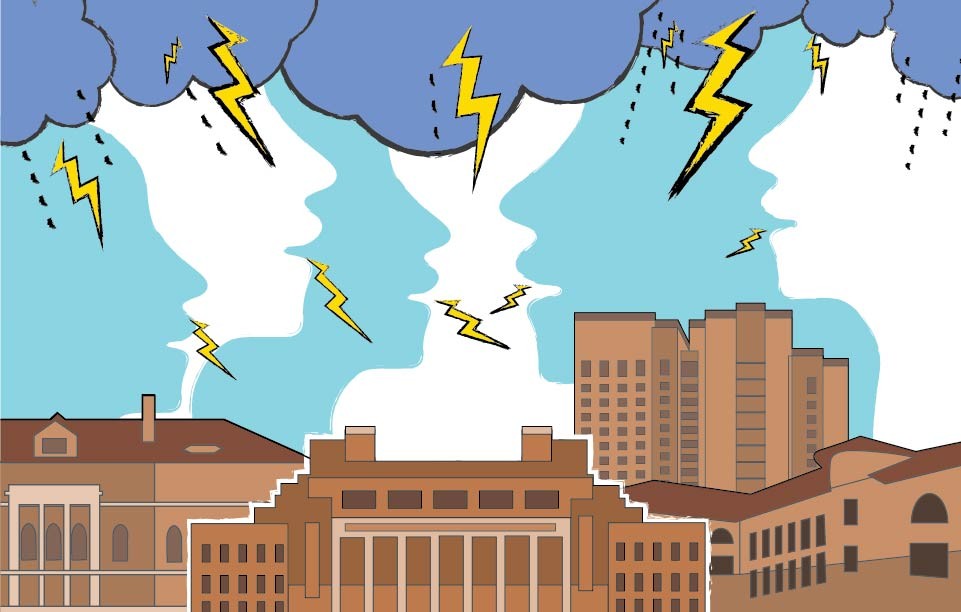After weeks of back-and-forth about renaming buildings on campus, some people at the University of Minnesota are concerned that public focus has diverted from how the campus should reckon with its racist and anti-Semitic history.
Supporters and critics continue to trade barbs over a task force’s 125-page report calling to rename Coffman Union and three other buildings. As the conflict continues, concern grows over a distorted conversation about the University’s history. But regents have stuck by their criticism, saying it’s important to get a full understanding of the facts.
Some have criticized President Eric Kaler for not taking a more vocal role in defending the task force’s work and his own “preliminary recommendation” to go forward with renaming.
“We are awaiting a forceful and strong statement on his part that says quite clearly those [regents’] statements are incorrect,” said Riv-Ellen Prell, curator of the “A Campus Divided” exhibit who advised the task force.
Kaler said he supported faculty at a University Senate meeting earlier this month. However, he demurred on a question about whether charges of academic dishonesty against the task force hold merit.
“The situation around this is complicated right now and I think trying to untangle one particular string on top of other strings is a little hard to do right now,” Kaler said at the meeting.
For Prell, Kaler’s statements haven’t gone far enough, especially because he appointed the task force and supported its findings.
“I think it is time for the president of the University of Minnesota not to take a stand on the naming or renaming, not to question the right of regents to take a position, but to more forcefully and vigorously defend the task force,” Prell said.
University senior Chloe Williams, who started a petition to rename Coffman last year, said accusations against the task force have diverted attention from more important issues.
“We’re straying away from how, as [a] university, we can reckon with our history,” she said. “Anti-Semitism and racism was on our campus, and to claim that administrators didn’t perpetuate it is kind of appalling.”
William Jones, a member of the task force, said it’s important that people who are not historians feel they can engage in the historical debate. However, he said regents’ bad-faith accusations have largely gone unchallenged in the media.
“We can have a disagreement over what happened, but don’t accuse us of lying or being dishonest,” he said.
Regent Michael Hsu maintains his accusation that task force members manipulated the report.
“They’ve distorted the conversation for over 18 months and they’ve defamed four prominent members of our University community who are dead, who can’t speak for themselves,” he said.
Hsu said advocates are pushing forward with renaming when people don’t know the facts. “If you want to reckon with the history, I think you need to understand that history, not just a part of the history. What they’ve done is only told part of the story,” he said.
Regent Darrin Rosha, another vocal critic of the task force, said it’s fair for regents to review evidence presented to the board.
“The response to the questions that have been raised has been ad hominem attacks on board members for simply raising the questions. I make no apologies for asking legitimate questions about the substance of the report,” Rosha said.
He said discussion can’t move forward until there’s clarification about the “actual factual underpinnings.”
Regent Abdul Omari, the only regent to currently support renaming, said the accusations have overshadowed other ways to acknowledge the University’s history. For example, the task force also recommended installing historical exhibits in buildings, he said.
“That has also been completely lost,” he said.
Prell said the entire conversation about the University’s history has been “distorted” by accusations, which she blames on those who are unwilling to speak up.
“It is a distortion that is in the hands of both the absence of regents being willing to speak up on a divided board of regents and the president of the University … [for] not more forcefully defend the academic integrity of the task force report,” she said.
The board’s apparent split on the issue has provoked questions about how regents will take up renaming at their May meeting. Kaler and Board Chair David McMillan said they are working on determining the right path forward.
“Regardless of support for or oppos[ed] to renaming, we must find a way to come together as a community and acknowledge past racial discrimination and anti-Semitism that took place on this campus,” he said at the Senate meeting, pointing out “there is not widespread board support for renaming at this time.”
But after a long fight for renaming, Williams said the current conversation is disheartening.
“It’s just a little disappointing that it has to take so much extra time in order to get to that place, when this issue has been talked about for over a year now,” she said.
Jake Steinberg and Dylan Anderson contributed to this story.








